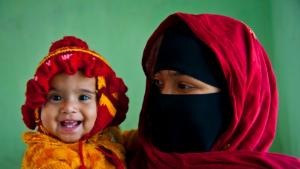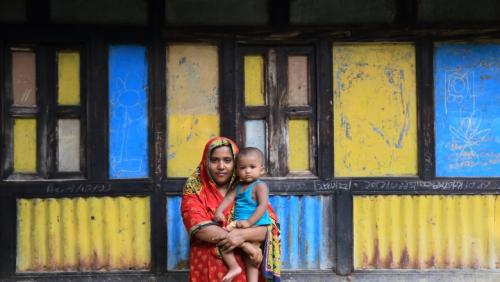In Bangladesh, Providing Safety Nets to Young Mothers for a Promising Future
While Bangladesh has significantly reduced child and maternal mortality, the country still remains among the 10 countries with the highest prevalence of malnutrition. According to Bangladesh Demographic and Health Survey (BDHS) 2014, 36.1 percent of children under 5 are considered to be short for their age or stunted. The World Bank is supporting the Government of Bangladesh with a $300 million credit for the Income Support Program for the Poorest (ISPP) Project. The Project, called “Jawtno” (“Care” or "Nurture" in Bangla), will provide cash transfers to 600,000 poor mothers as income support, while improving their children's nutrition and cognitive development. Evidence from the “Shombhob” pilot shows that well-targeted and implemented social assistance can have a significant impact on increased consumption and improved nutrition levels. Jawtno will benefit 10% of the poorest across 43 of the poorest Upazilas which have high probability of child malnutrition.

Over 600,000 young mothers and over a million children stand to benefit from this program.

Challenge
Well-designed safety nets can improve child health and nutrition outcomes, while contributing to poverty reduction goals. In spite of spending over 16 percent of its budget (or 2.5 percent of GDP) on over 100 safety net programs, only a small portion supports programs that aim to improve maternal and child nutrition and cognitive development. The Government’s National Social Security Strategy 2015 recognizes that more investment is required towards this vulnerable target group.
The sector also faces implementation challenges, with over 20 line ministries implementing multiple programs, resulting in lack of coordination and overlap. Union Parishads, responsible for implementation at the field level, also face administrative and financial capacity issues. The Project will help set up common administrative platforms at the local level for safety net beneficiary identification, enrollment and payment which has the potential to improve service delivery across programs.
Approach
Ensuring adequate nutrition prenatally and in the first two years of a child’s life is critical for health and brain development. With a combined focus on cognitive development up to five years of age to maximize intelligence and children’s abilities can lead to boosting earning capacity in later years, and thereby preventing intergenerational transmission of poverty. The ISPP Project will provide income support to the poorest mothers against their utilization of services aimed at improving their children's nutrition and cognitive development.
Pregnant women and mothers of children below 5 years, from extremely poor households, will be eligible for social assistance under the Project. By fulfilling their co-responsibilities, beneficiaries will receive cash transfers. The Project also helps improve the coordination among safety net programs at the local level by building common administrative and service delivery platforms, in partnership with the Directorate General of Health Services, the Postal Directorate, and the Bangladesh Bureau of Statistics.
" I hope the duration and coverage of the program can be expanded where there are more mothers like me who are poor and vulnerable. My children are now happier because they are healthier and it is all due to the knowledge I gained from participating in the nutrition sessions offered by the Shombhob pilot program. "
A beneficiary of Shombhob ("possible") from Lalmonirhat
Expected Results
· 600,000 poorest mothers expected to receive cash transfers
· 2.7 million poor people across 43 upazilas in northern Bangladesh to benefit
· Improved capacity of local level government to deliver safety net programs
Towards the Future
With partnership arrangements in place with various stakeholders and central and field level staffing completed, the Project commenced field activities from December 2016. A rigorous evaluation, funded by the UK Children’s Investment Fund Foundation, will look at the impact of the program on aspects including household consumption, child nutrition and cognitive development, children’s readiness for school and women’s empowerment. The baseline survey was conducted in November 2016 followed by the endline in 2018.
Basic Information
Approval Date
December 16, 2014
Effectiveness Date
April 16, 2015
End Date
June 30, 2020
Total Commitment
$300 million
Implementing Agency
Local Government Division
Source: World Bank
- 500 reads
Human Rights
Ringing FOWPAL’s Peace Bell for the World:Nobel Peace Prize Laureates’ Visions and Actions

Protecting the World’s Cultural Diversity for a Sustainable Future

The Peace Bell Resonates at the 27th Eurasian Economic Summit

Declaration of World Day of the Power of Hope Endorsed by People in 158 Nations

Puppet Show I International Friendship Day 2020

